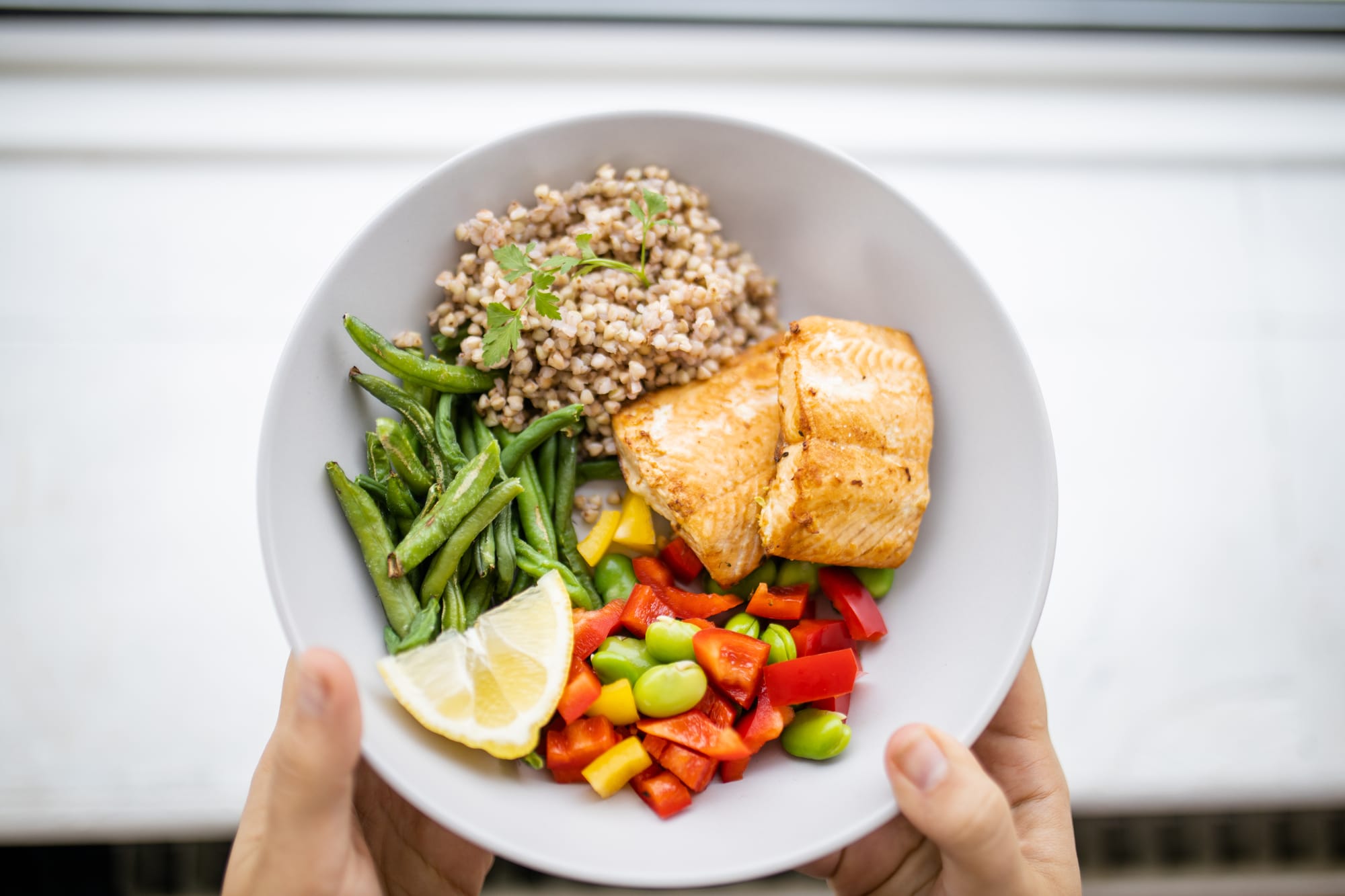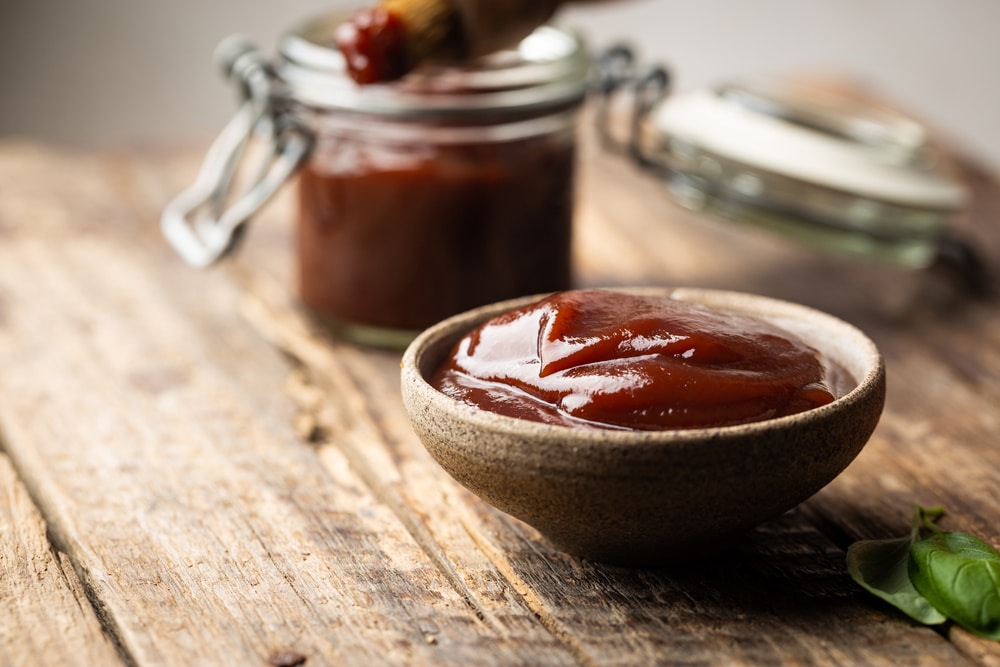
First thing’s first: If you are eating healthy, hopefully you’re feeling better! Getting rid of processed foods and feeding your body real nutrients is so important for your overall health. (So you’re already ahead of the game!)
But even though the quality of your food choices has improved, there are still several other reasons why you might not be losing weight despite eating healthy.
So, if you’re eating healthy but not losing weight, the following are 10 factors you may not be taking into consideration.
Calorie Intake  Photo Credit: Shutterstock
Photo Credit: Shutterstock
Even healthy foods have calories, and quantity does matter!
You won’t lose weight if you consume more calories than your body needs. Make sure you’re in a calorie deficit — meaning, you’re burning more calories than you’re consuming.
Portion Sizes  Photo Credit: Depositphotos
Photo Credit: Depositphotos
Even healthy foods can lead to weight gain if you’re eating large portions! Be mindful of portion sizes and try not to overeat, even if the food is healthy.
Hidden Calories  Photo Credit: Shutterstock
Photo Credit: Shutterstock
Be aware of hidden calories in sauces, dressings, and other condiments. They can add up quickly and sabotage your weight loss efforts.
Exercise  Photo Credit: Depositphotos
Photo Credit: Depositphotos
While diet is crucial for weight loss, exercise also plays a significant role. Make sure you’re engaging in regular physical activity to burn extra calories and improve your overall fitness.
Medical Conditions  Photo Credit: Shutterstock
Photo Credit: Shutterstock
Certain medical conditions, such as thyroid disorders or polycystic ovary syndrome (PCOS), can make it harder to lose weight. If you suspect a medical condition might be hindering your progress, consult a healthcare professional.
Stress and Sleep  Photo Credit: Shutterstock
Photo Credit: Shutterstock
Chronic stress and lack of sleep can interfere with your body’s ability to lose weight. Both can disrupt your hormones, making it harder to shed pounds.
Muscle Gain  Photo Credit: Shutterstock
Photo Credit: Shutterstock
If you’re also exercising, you might be gaining muscle mass, which is denser than fat. This could make you leaner and healthier without a significant change in weight.
Water Retention  Photo Credit: Shutterstock
Photo Credit: Shutterstock
Sometimes, your body retains water, especially if you’ve recently changed your diet or exercise routine. This can mask weight loss on the scale. It’s essential to look at trends over time rather than focusing on daily fluctuations.
Metabolic Rate  Photo Credit: Shutterstock
Photo Credit: Shutterstock
Your metabolic rate, influenced by genetics and muscle mass, affects how many calories your body burns at rest. Some people naturally burn more calories than others.
Lack of Patience  Photo Credit: Shutterstock
Photo Credit: Shutterstock
Weight loss takes time. It’s not always a linear process, and there will be periods where you might not see the scale move despite your efforts. Be patient and focus on overall health improvements.
In my 35 years of experience as a personal trainer and health coach, if you want to lose weight, tracking your calories and tracking your exercise minutes can be very eye-opening. Stay the course — you didn’t gain the weight overnight, and you can’t lose it overnight either!
With persistence, patience, and hard work, you’ll reach your weight loss goals.
9 Blue Zone Foods to Increase Longevity  Photo Credit: Shutterstock
Photo Credit: Shutterstock
Blue Zone foods promote longevity while giving you serious health benefits in daily life.
How do we know? The truth is in the numbers! The longest living social circles of people use healthy habits mixed with the Blue Zones diet.
The following nine foods are found in the diets of people who are outliving the rest of us.
9 Blue Zone Foods to Increase Longevity
Strength Training for Women Over 50: 11 Best Moves  Photo Credit: Get Healthy U
Photo Credit: Get Healthy U
There are many factors involved in maintaining good physical and mental health as you age, but one of the most important things to consider as you grow older is weight training.
These strength training exercises are proven to get results for women over 50!
Strength Training for Women Over 50: 11 Best Moves
Sugar Detox: How To Quit Sugar In 6 Steps  Photo Credit: Shutterstock
Photo Credit: Shutterstock
It’s hard to find the best way to quit sugar when it’s in so many of our foods! That’s why it’s important to cut back in a smart, sustainable way since doing it cold turkey can be pretty jarring for your body.
Here, we’ll take a look at some of the sugar basics, why you crave it, and how to quit sugar without making yourself totally miserable.
Sugar Detox: How To Quit Sugar In 6 Steps
Struggling to Shed Pounds Despite Eating Well? Discover 10 Common Mistakes That Could Be Holding You Back
Mistake #1: Not Tracking Your Food Intake
Eating well is essential for weight loss, but it’s equally important to keep track of what you’re consuming. Many people underestimate the amount of food they eat or forget about the little snacks and bites throughout the day. By keeping a food diary or using a mobile app, you can accurately monitor your calorie intake and identify areas where you may be overindulging.
Mistake #2: Overestimating Portion Sizes
Even if you’re eating healthy foods, consuming too much can hinder your weight loss progress. Portion control is key. Be mindful of serving sizes and use measuring cups or a food scale to ensure you’re not unknowingly eating more than you should. It’s easy to underestimate how much you’re actually consuming, so taking the time to measure can make a big difference.
Mistake #3: Relying Too Much on Processed “Healthy” Foods
While some processed foods can be part of a healthy diet, relying too heavily on them can hinder weight loss. Many processed “healthy” foods are still high in calories, sugar, and unhealthy fats. Opt for whole, unprocessed foods as much as possible. Focus on incorporating fruits, vegetables, lean proteins, and whole grains into your meals and snacks.
Mistake #4: Skipping Meals or Restricting Calories Too Much
Skipping meals or severely restricting calories may seem like an effective way to lose weight, but it can actually backfire. When you deprive your body of the fuel it needs, it can lead to overeating later in the day or a slower metabolism. Aim for balanced meals and snacks throughout the day to keep your energy levels stable and prevent overindulging later on.
Mistake #5: Not Drinking Enough Water
Water is essential for overall health and weight loss. It helps to keep you hydrated, aids digestion, and can even help control your appetite. Often, people mistake thirst for hunger and end up eating more than necessary. Make sure to drink enough water throughout the day and consider having a glass before meals to help you feel fuller.
Mistake #6: Lack of Physical Activity
Eating well is important, but it’s only one piece of the puzzle. Regular physical activity is crucial for weight loss. Find activities you enjoy and make them a regular part of your routine. Aim for a combination of cardio exercises, strength training, and flexibility exercises to maximize your results.
Mistake #7: Not Getting Enough Sleep
Sleep plays a significant role in weight management. Lack of sleep can disrupt your hormones, increase cravings, and affect your metabolism. Aim for 7-9 hours of quality sleep each night to support your weight loss efforts.
Mistake #8: Emotional Eating
Emotional eating can sabotage your weight loss goals. Many people turn to food for comfort or as a coping mechanism for stress, sadness, or boredom. Instead of reaching for food when emotions run high, find alternative ways to deal with your feelings. Engage in activities like reading, exercising, or talking to a friend.
Mistake #9: Unrealistic Expectations
Setting unrealistic weight loss goals can lead to frustration and disappointment. Remember that healthy weight loss is a gradual process. Aim for 1-2 pounds per week, which is considered a healthy and sustainable rate. Celebrate small victories along the way and focus on overall health and well-being rather than just the number on the scale.
Mistake #10: Lack of Consistency
Consistency is key when it comes to weight loss. It’s important to establish healthy eating habits and stick to them in the long term. Avoid extreme diets or quick fixes that are hard to maintain. Instead, focus on making sustainable changes that you can incorporate into your lifestyle for the long haul.
By avoiding these common mistakes, you can overcome the barriers that may be holding you back from shedding pounds despite eating well. Remember to consult with a healthcare professional or registered dietitian for personalized advice and guidance on your weight loss journey.







